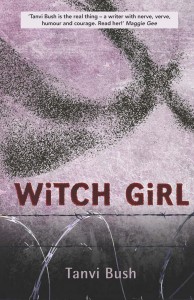Book Review
To read an interview with Tanvi Bush click here.
. . . Zambia, this odd gentle country spread like a butterfly on the navel of Africa,speared from above by Congo and bolstered from beneath by its sibling Zimbabwe.
—Tanvi Bush, Witch Girl
From Zambian author Tanvi Bush comes the smooth-flowing tale of siblings orphaned by the HIV/AIDS pandemic that swept through Africa beginning in the 1990s. The novel tells the heartbreaking story of a tenacious ten-year-old girl named Luse, whom we meet during her time on the streets of Lusaka. She is self-sufficient and pragmatic, a scavenger not above trickery to get what she needs to sustain herself and her little brother, Joshua. The novel beautifully captures the orphans’ daily struggle for life and the bonds they forge with other displaced children.
Bush, a British citizen, grew up in Zambia, a former British colony that gained its independence in 1964. Her years there have defined her work, and while this is her first novel, Bush is already an experienced filmmaker. Her documentary film, Choka!—Get Lost!, about a group of street boys who formed the Red Cross Under-11 football team in Zambia, was nominated for an Oscar. Bush’s interest in the HIV/AIDS epidemic sprang from volunteer work with orphaned children forced onto the streets during the 1990s, a time when Zambia experienced an overwhelming influx of religious organizations, many claiming outrageous cures for the disease, such as sleeping with virgins, blood transfusions, and cannibalism. In Witch Girl, Bush fictionalizes these false claims by those calling themselves Christians. The title is drawn from the ongoing phenomenon of accusing children of witchcraft, which is not confined to Zambia and is due, in part, to a clash of traditional African beliefs and extreme Christian fundamentalism. Street children are especially likely to be targeted as witches, and some have been accused and abandoned by their own families.
In Witch Girl, Bush takes the reader into murky bars, evangelical churches, sacred caves, dirty back streets, and the muddy African bush to tell Luse and Joshua’s story: their imprisonment by a Christian cult calling themselves the Blood of Christ; their escape with the help of a foreign filmmaker documenting the organization and its exploitation of children; and their quest to find the doctor whose name the filmmaker has hastily told them. But they have only two leads: a silver cigarette case and the badly misunderstood name. It takes Luse four months to find the doctor—four months of hard-living on the streets of Lusaka, where she loses one friend to a brain hemorrhage and another to the anesthetizing lure of huffing, and where she struggles to keep herself and Joshua safe from predators, including the authorities.
But life wasn’t always so tough. Luse recalls a time not long ago when she had a family—a loving father and mother, a home, and a grandmother who taught her about herbs and healing medicine. Her grandmother died during those family years—a passing that was celebrated according to Zambian tradition with a burial alongside a pool in a barely accessible cave. The ceremony brought Luse in touch with her heritage and identity:
I am standing in a burial ground, [Luse] thinks, and at the same time understands at last what the trench is for. Gran.
She stands for a moment letting this realisation sink in all the way to her toes, but she is not sad. She cannot think of a more wonderful place to be buried. It is almost with joy that she begins vigorously sweeping again. They clear the whole area from the pool to the cave walls. Afterwards they rinse the headstones with water.
Her grandmother’s death marks the beginning of Luse’s many losses. Soon afterward, her father falls ill to full-blown AIDS, and her mother is not far behind. Before he dies, her father joins the Blood of Christ church, and thus, the children’s fate lands in the hands of an unholy priestess who understands the monetary value of orphaned children.
Bush’s prose is spare and fast-moving, like water over river stones. The narrative unfolds effortlessly, moving back and forth in time without disorienting the reader. Though Witch Girl, at times, reads like a crime novel and the plot feels slightly forced toward the end, these flaws can easily be forgiven because of the novel’s engaging characters, the richness of its Zambian setting, and its accurate depiction of the countless tragedies that have unfolded there. It is well worth the read.
About the Reviewer
Heather Sharfeddin is the author of four novels. Her work has earned starred reviews from Kirkus Reviews and Library Journal, has been honored with an Erick Hoffer award and at the New York and San Francisco Book Festivals, as well as the Pacific Northwest Book Sellers Association. Her first novel, Blackbelly, was named one of the top five novels of 2005 by the Portsmouth Herald.
